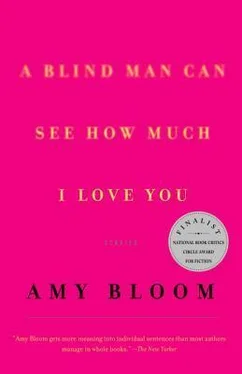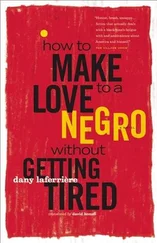“What?”
“The Pediatric Volunteer Program. After orientation, you spend time with children on the unit until they go home.”
“Or die.”
Jessica looks at Marc, who is no longer touching my shoulder in a display of emotional support. He cradles his face in his left hand, rolling a wet cork across the table with his right index finger.
“Oh no, you don’t spend time with terminally ill children. Our volunteers visit with the children recovering from surgery, getting fitted for prostheses, things like that. Not terminal cases.”
I can see her thoughts through a suddenly opened window in her forehead. Jesus, she’s thinking, this woman is clearly not suitable for any kind of program, how do I leave without upsetting her? The transparent patch in Jessica’s forehead is a product of sleep deprivation, as Mary Lou has already explained to Marc and me. The moments when Saul, at various ages, comes to me and weeps in my arms, the tendency to see people’s words as they say them and sometimes when they don’t, the sensation that objects are only two-dimensional — these are typical symptoms of sleep deprivation. Not to worry.
“I’ll think about it. Why don’t you leave your card. Thanks for coming. Good-bye.” I think this comes out pretty well, but I can see from her face that I have left out something key, like inflection. Too bad. If she wants affect, she can talk to Marc. I go upstairs and lie down with my shoes on (but my soles don’t touch the bedspread — I’m not that far gone) until I hear the front door close.
Another agonizing evening with the O’Connor-Schwartzes begins. Marc is solicitous, then hurt, then apologetic, then furious, then guilty, then back to the beginning, then exhausted. He usually falls asleep between guilt and the third bottle of wine.
I cannot kill myself — we do not commit that sin, it is such bad form — but I find myself teetering at the stair landings, walking quickly on the narrow, slick marble steps of the library, seeing how long I can keep my hands off the steering wheel. Come and get me.
This is not a hospital ward, it is the Hieronymus Bosch Pediatric Purgatory. I have been told to wait with the other child lovers shuffling along in pastel sweatsuits and massive sneakers or two-hundred-dollar cardigans thrown over jeans and posy-covered turtlenecks. Apparently, only women are in need of this kind of entertainment. As we go through the halls of gasping infants, and toddlers with metal shunts sticking out of their heads, and older children playing tag with their IVs, I notice that my little group is more varied than I thought. Two of the six look late-middle-aged, and their expressions are of pleasant concern and universal affection. Two others are quite young, very Junior League, and if they have lost babies they’ve been spending quite a bit of time in the gym ever since. The woman right next to me is black, meaning the color of strong coffee, and her expression, at least, is familiar to me. She looks enraged and terrified, and when she sees a nurse her lips curl up and back, revealing wonderfully pointed incisors. When we are seated for orientation, in a window-less room with firmly cushioned chairs and love seats, I perch on the edge of a table, and the little nurse leading the group knows enough not to encourage me to join the circle. She asks what each of us hopes to get out of this program, and the others say whatever they say, and the black woman and I snarl and look away. Even I, with my impaired judgment, cannot believe that they’re going to let people like us have contact with helpless children. Then she asks if we have preferences about the kids we spend time with. The others say prettily that it really doesn’t matter. The she-wolf says, “Not a black child,” and I say nothing at all.
I ask for a little time to get acclimated, and the nurse lets me trespass quietly, unsupervised. All the children I see are engaged. They are being fed and held, or being sung to as their dressings are changed. They cry out briefly as their scarlet stumpy parts are washed and rewrapped. When the nurses and aides see me watching, they scowl or smile quickly; visitors are not much help. Some of the rooms are overflowing with Mylar balloons, photo-filled bulletin boards, parents, toys, comic books. I am looking for a room with nothing but a kid and a cot.
He is there, at the end of the hall. He comes out of his room to greet me in a state-of-the-art wheelchair, its front built up like a combination keyboard and portable desk. He holds a silver stick in his mouth and presses the keys on the console with it. We watch each other. He is ugly, not at all what Saul would have been. Sallow, greasy little rat face, buzz-cut black hair, stick-out ears. As he bends over the console, I see the back of his thin, hairy neck.
“Hey,” he says, letting go of the stick. I thought he couldn’t be more than three, but no toddler could speak like that — as if he’d been living on the streets for fifteen years and this hospital was just one more dead-end job.
“Hey, yourself.” I’m blushing.
“Could you move?”
I flatten myself against the wall and he rolls past, stick pressed hard to the flat orange disk in a row of concave blue buttons. The wheelchair has tires fit for a pickup truck, and the sides go up to his neck like a black box. I look down as the whole thing lumbers past. Under his little T-shirt he has no arms.
“Bye,” I say.
“Yeah.”
I cannot befriend the nurse at the front desk, but I do persuade her to tell me about him. Jorge. His story is horror upon unending horror — proof, not that I needed it, that the thought of a God is even more frightening than a world without one. Nobody is coming to take him home. He is not considered lovable, and the occasional saints — the foster parents who take in the AIDS babies and the cancer-ridden children — don’t want him. What does he like? I ask the nurse. Nothing, she says. Whatever he likes, he’s been keeping it to himself.
I wait by his room. He will not show his pleasure, but he will be reluctantly, helplessly pleased. Who has ever come back for a second, nonclinical look?
“Gum?”
“What kind?”
“Bubble Yum. Mint or grape.” It is what I chew.
“Grape.” He opens his mouth, and I unwrap the gum and place it on his white-coated tongue. He chews away, and then purses his lips around his joystick and moves off. At the end of the hall, he sits up and looks over his shoulder at me. He tongues the stick aside, keeping the blue gum in.
I wave. “See you tomorrow, Jorge.”
At home, I prepare for diplomacy and war. I shower, even using the marjoram gel. My spirits are lifted. I make Julia Child brisket and arrange a pretty salad. I open a bottle of Stag’s Leap and use the big-bowled wineglasses, the ones I have to wash by hand.
I tell Marc about him, lying. I make him sound sweet, responsive, appreciative. I don’t tell the story the nurse told me: how he spat in the face of an aide, saving up a mouthful of penicillin to do so. I don’t mention his all-over ugliness, the gooey squint in his right eye, the slight fecal odor surrounding him. I might as well have told Marc the truth. No, he says, we cannot take a disabled child right now.
We? I have to laugh. That old joke: What do you mean “we,” white man? I pick over the words in my mind, to get him to say yes, and then I don’t care.
“I’m bringing him home if they let me. He doesn’t have to be in the hospital, but his family can’t care for him, and his needs are too much for a residential place.” Of course they’ll let me. It must cost a fortune to keep him. And he’s so ugly.
“If you bring him home, I don’t know … I don’t think I can stay. Please don’t do this to us.”
Читать дальше












